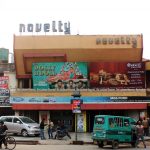Suryakant Tripathi ‘Nirala’
Sun which Never Set
Decades ago, the poem ‘Saroj Smriti’ in the memory of his beloved daughter had imbued the world in the sea of emotions. Today it is widely revered in literary circles that make the poet immortal. One of the towering figures of Hindi literature- a poet, novelist, essayist, a story- writer and an occasional painter (very few know this aspect of him), Suryakant Tripathi was born on 21 February 1896. Though Suryakant’s parents originally hailed from the Unnao district of Uttar Pradesh, they were settled in Bengal for long. His father Ramsahai Tripathi worked as the government servant in Midnapore district of West Bengal. Known earlier as Suryakumar, his life was struck by misfortunes especially in 1819 when he lost his father and other family members in successive years. Having lost his mother at the age of three, the responsibility to bring him up fell on this father at whom insistence Suryakant’s primary education was in Bengali medium. At the tender age of eight, his creativity had come to the fore when he started writing poems in Bengali.
Having married at the age of fifteen to Manohara Devi, his wife’s contribution can be regarded as a boon for his career. Once taunted by his wife over not knowing Hindi language, Suryakant took to learning the language through magazines. His first work in Hindi ‘Juhi Ki Kali’ was composed in 1916. Little did he know that he would become an inspiration for generations of Hindi writers in the years to come. During his stay in Bengal, he translated works of Rabindranath Thakur, Chandidad, Vivekanand and later on edited the Hindi magazines ‘Samanvaya’ and ‘Matwala’.
He shifted to Lucknow in 1928 when he had carved his niche as a prominent Hindi author. His twelve-year stay in Lucknow can be regarded as most creative phase of his life. He worked as an assistant editor with ‘Sudha’ (Ganga Pustak Mala office) in Lucknow. His collection of poems ‘Parimal, novels like ‘Alka’ ‘Apsara’, ‘Prabhavati’ and ‘Geetika’ took shape during this period. He even formed an association of like-minded authors of whom Ramvilas Verma, Sumitrakumari, Rajendra Chaudhary, Kunwar Chandraprakash Singh were prominent members.
It is notable that Suryakant has made Lucknow as the center-stage in many of his works. His novel ‘Nirupma’ revolves around Lakhnavi localities like Sundarbagh, Charbagh and Lucknow University. His stories like ‘Devi’, ‘Premika Parichaya’, ‘Padma aur Lily’ portray conditions of Lucknow. One can find detailed description of Lucknow in his essays like ‘Gandhi se Bhet’ and ‘Mansukha ko Uttar’.
Suryakant can be regarded as among the prominent members of the Chhayawaad era or Neo-Romantic phase of Hindi literature alongwith Jaishankar Prasad. Perhaps Suryakant is the only poet among Chhayawadis whose works reflect a close relationship with the Bhakti tradition. His writings vehemently opposed the prevailing ills in the society, which also earned him critics. Though nationalism and revolution were the chief contents of his writing, the history of languages, mythology and religion and nature have also been dealt in his works. His writings often reflected his thorough study of the Puranas. He firmly believed in the ideologies of the likes of Swami Vivekananda, Sri Ramkrishna Paramahansa and Rabindranath Tagore, which enriched his writings. Since his style of writing marked a break with the contemporary tradition, Suryakant received the title of ‘Nirala’, which means ‘unique’. Credit goes to him for introducing blank or free verse as the style of poetry and popularizing the khari dialect of Hindi. His works incorporated the popular forms of poetry – folk song, ghazal, biraha, kajri and the like. His works evoke rich, vivid pictures of imagination in the mind of the reader and imbues him with emotions. Suryakant never hesitated to experiment in his works as reflected in his poem ‘Kukurmutta.’ Incorporating words from various languages, ‘Kukurmutta’ symbolized a major break in the language and tradition of poetry. The revolutionary change that he brought in the language and its complete tenor, in the subject matter and in transferring reality to the level of consciousness is also reflected in ‘Naye Patte’ and ‘Bela’. As he had himself said, “Noopur ke swar mand rahe, Jab na charan swachhand rahe” (As long as the feet were tied, it was not possible to dance), his poetry reflects the expansion of the consciousness of freedom, which is interwoven in many forms in his works.
It is said that his work ‘Ram ki Shakti Puja’ portrays the high and lows of his life in a dramatic way. Generosity and self-esteem were hallmarks of his personality. He gave alms as much to unknown people as to his acquaintances. His self-esteem enabled him to voice his opinion on all wrongs. It would be relevant to mention his argument with the chairperson Mahatma Gandhi at the Hindi Sahitya Sammelan in Indore. At the conference of 1935-36, Gandhi had asked who were Hindi’s Ravindranath Thakur, Jagdish Chandra Basu and Prafullchandra Rai? Suryakant seized the opportunity to point out to Gandhi that the latter had mentioned the name of only Pandit Banarsidas Chaturvedi as among the prominent Hindi authors, while chairing the conferences.
“Have you thought what effect it would have on Hindi authors?” Nirala rebuked.
Gandhi: I don’t know anything about Hindi.
Nirala: So what right do you have to ask who is Hindi’s Ravindranath Thakur?
Gandhi: I meant something else
Nirala: So you meant that you did not want authors like Ravindranath in Hindi literature?
The entire audience was stunned at his remark. Such was Suryakant who always stood for the right of Hindi authors. Suryakant breathed his last on 15 October 1961. Before his death, he had rightly said of himself:
“Pase Margan samajh mein aayenge ye kaun humdum the,
Samar au gul khijan mein garmiyon mein aabe-jamjam the”
After his death, people recall what he was. They recall him like flowers during autumn and cold water in sultry summers. Today in this era of deteriorating literature, this has proved true with author Shiv Murti bestowing him the stature of a ‘mahakavi’, who gave new heights to poetry.
Ashita Kulshreshtha
Writer is a Freelance Journalist and a student of Journalism
(Published in The Lucknow Observer, Volume 1 Issue 11, Dated 05 February 2015)




